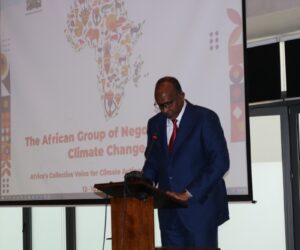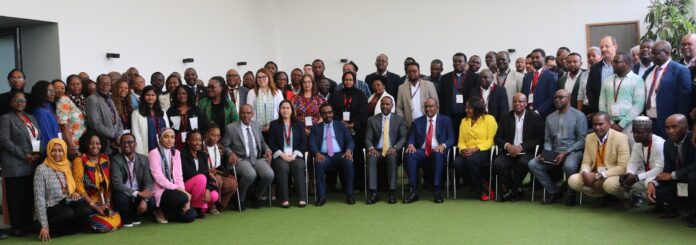The African continent has not received sufficient financial and technical support to effectively implement, track and report on their current Nationally Determined Contributions (NDCs) even as countries build momentum towards a new set of NDCs.
Adan Bare Duale of Kenya’s Ministry of Environment, Climate Change and Forestry says the lack of clarity on the amount of current and future funding, capacity building and technical support required to implement NDCs undermines the transparency of support framework under the Paris Agreement on Climate Change.
“As countries are building momentum towards a new set of Nationally Determined Contributions (NDCs), the African continent has not received sufficient financial and technical support to effectively implement, track and report on their current NDCs,” Mr. Duale told the African Group of Negotiators on Climate Change (AGN) COP29 Preparatory Meeting in Nairobi, Kenya. “We also lack clarity on the amount of current and future funding, capacity building and technical support required to implement our NDCs. This vagueness undermines the transparency of support framework under the Paris Agreement and should be prioritized in the upcoming negotiations”.
The Cabinet Secretary reiterated Africa’s climate-induced socio-economic challenges and outlined the continent’s priorities for COP29 scheduled for Baku, Azerbaijan in November.
“African countries have seen major droughts and floods; storms and cyclones have intensified and become more frequent, while the financial and technical capacity of the continent to adapt to climate change and increasing climate and natural hazards continues to be limited,” he said, adding that by 2050, negative climate impacts could cost African countries up to USD 50 billion annually.
“Our priority, therefore, is to increase the ability to adapt to the adverse impacts of climate change and foster climate resilience and low greenhouse gas emissions development, in a manner that does not threaten food production. A crucial and most urgent objective of this meeting is to prepare our common position paper for COP29. Firstly, finance will lie at the heart of climate diplomacy at COP29 as a critical enabler of climate action. Climate finance is flowing to the continent at an insufficient scale and in unequal directions. Securing a strong favourable finance deal at COP29 is therefore vital,” he stated.

Priorities on Climate Finance and Adaptation
Another priority area is adaptation and loss and damage for Africa as climate impacts worsen. COP29 is deemed a pivotal opportunity to prioritize adaptation and loss and damage and secure the necessary financial and technical assistance to close the adaptation finance gap.
AGN Chair, Ali Mohamed, urged negotiators not to lose focus on Africa’s key priorities of finance and adaptation in the context of the continent’s sustainable development and poverty eradication agenda.
“As we deliberate, the bigger picture for us remains climate finance and adaptation as we strive to achieve our sustainable development objectives as a continent. It is clear that our development challenges, which include high poverty levels, poor access to energy, clean water, food security and primary health care amidst a debt crisis, are already being compounded by climate change. It follows therefore that finance is at the pinnacle of our challenges and must be addressed, even as we strive to meet our climate obligations,” he said.
The African common position for COP29 is envisaged to be presented to the African Ministerial Conference on the Environment (AMCEN) and the Committee of African Heads of State on Climate Change (CAHOSCC) next month for consideration and adoption.
The common position includes elements that are considered a priority for Africa and for COP29, climate finance and adaptation rank top on the list.
“Africa’s unified position on climate finance, adaptation, and ambitious Nationally Determined Contributions (NDCs) reflects the continent’s unwavering commitment to sustainable development and resilience. The energy transition journey we embark on today is not just about shifting resources but redefining Africa’s future in a way that prioritizes both people and the planet. UNEP looks forward to working with the Africa Group of Negotiators on Climate to enhance global support for a green inclusive climate resilient future,” said Dr Rose Mwebaza UNEP Africa Regional Director.

